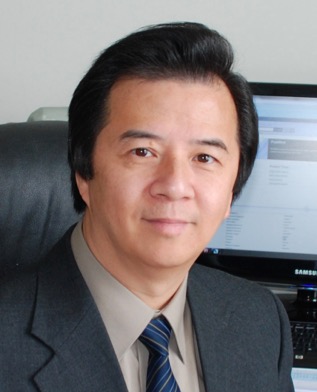Xiaofeng Yang

Xiaofeng Yang, MD.
Professor, Department of Neurobiology, Capital Medical University
Principal Investigator, Center of Epilepsy, Beijing Institute for Brain Disorders
Director, Laboratory of Neuroelectrophysiology, Xuanwu Hospital
Summary:
Dr. Yang is currently a professor of neurology at the Capital Medical University (CCMU) and a principal investigator at Center of Epilepsy, Beijing Institute for Brain Disorders. He received his M.D. from Beijing University in 1983. He completed postdoctoral training at Washington University in St Louis in 1999, where he was later appointed a research assistant professor in the Department of Neurology. Dr. Yang joined the Department of Neurology at the University of Minnesota School of Medicine as an associate professor in 2007. He joined the Capital Medical University as a distinguished professor and epilepsy research academic leader in 2013.
Dr. Yang's research laboratory performs studies on basic mechanisms of epilepsy and has been committed to translational research, specifically the development and application of new medical devices to control medically intractable epilepsy. A major focus of his research is the use of rapid cooling utilizing small thermoelectric devices to control focal neocortical seizures. A second area of interest for Dr. Yang involves studying the clinical applications of a novel optical technique involving caged–GABA to control focal epilepsy in rodent seizure models. His third major area of research involves using electrophysiological and neuroimaging techniques to study the mechanism of novel antiepileptic drugs. Currently, he is investigating the use of responsive closed-loop deep brain stimulation to control intractable seizures in animal models and developing new algorithm to automatically detect the high frequency oscillation to help clinical localization of epileptogenic zone.
Academic Appointments and Experience
Board member of China Association Against Epilpsy, Standing member of Board of Beijing Association Against Epilpsy, Standing member of Board of Beijing Epilepsy Diagnosis and Treatment Technology Innovation Alliance.
Research Interests:
1. Rapid cooling utilizing small thermoelectric devices to control focal neocortical seizures
The study focused on developing a novel therapeutic technique, rapid cooling utilizing small thermoelectric devices, to control focal neocortical seizures. Dr. Yang’s research has demonstrated that rapid cooling can terminate seizures in animal models. Currently, the technology is being implemented in clinical trials.
2. A novel optical technique involving caged–GABA to control focal epilepsy
This project investigates the effect of light-emitting diodes (LED) on photolysis of caged γ- aminobutyric acid (Caged GABA) and its uses for controlling focal epilepsy. Dr. Yang’s laboratory studies the local rapid release of natural inhibitory neurotransmitter γ-aminobutyric acid (GABA) in the seizure onset zone and its effects on the rapid reversal of abnormal neuronal excitability in order to achieve suppression or termination of seizures. Dr. Yang’s laboratory reported the world's first application of caged-GABA photolysis for controlling focal neocortical seizures in animal models.
3. Application of HFO to identify of epileptic foci
This study is mainly to explore the location, frequency, duration of high-frequency oscillation in epilepsy patients, and hope to find out the relationship between the high frequency oscillation and epileptogenic zone.
4. Study the mechanism of novel antiepileptic drugs
Through cooperation with UCB Pharma, Dr. Yang’s laboratory was the first to report the antiepileptic effects of Levetracetam (LEV) mediated by entry of the drug into presynaptic vesicles and binding to the vesicular protein, synaptic vesicle protein 2A. This discovery opened up a novel approach for the future development of new antiepileptic drugs.
5. Responsive closed-loop deep brain stimulation to control intractable epilepsy.
This research will test a novel approach to terminate seizures using responsive closed-loop stimulation in in vivo acute and chronic seizure models in rat. We also propose an adaptive algorithm that modulates the stimulus frequency or timing depending on the physiological activity.
6. Developing new algorithm to automatically detect the high frequency oscillation to help clinical localization of epileptogenic zone
In this project, we develop novel algorithm using the method of maximum distributed peak points to calculate dynamic baseline to improve the accuracy of baseline determination in channels with different HFOs activities so as to improve the accuracy of the automatic detection system.
Publications:
1. Yang XF, Bognar J Jr, He T, Mohammed M, Niespodziany I, Wolff C, Esguerra M, Rothman SM, Dubinsky JM. Brivaracetam augments short-term depression and slows vesicle recycling. Epilepsia. 2015 Dec;56(12):1899-909.
2. Yang X, Meehan AL, Rothman SM, Dubinsky JM. Seletracetam enhances short term depression in vitro. Epilepsy Res. 2015 Nov;117:17-22.
3. Smyth MD, Han RH, Yarbrough CK, Patterson EE, Yang XF, Miller JW, Rothman SM, D'Ambrosio R. Temperatures achieved in human and canine neocortex during intraoperative passive or active focal cooling. Ther Hypothermia Temp Manag. 2015 Jun;5(2):95-103
4. Yang XF, Rode DL, Peterka DS, Yuste R, Rothman SM. Optical control of focal epilepsy in vivo with caged γ-aminobutyric acid. Ann Neurol 2012 Jan;71(1):68-75.
5. Meehan AL, Yang XF, Yuan L, Rothman SM. Levetiracetam has an activity-dependent effect on inhibitory transmission. Epilepsia 2012 Mar;53(3):469-76.

